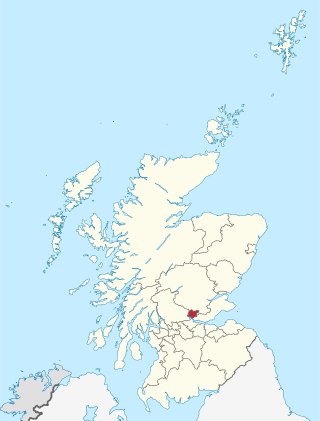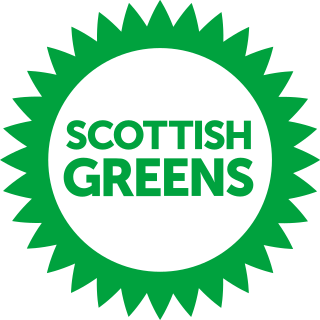Related Research Articles

Clackmannanshire, or the County of Clackmannan, is a historic county, council area, registration county and lieutenancy area in Scotland, bordering the council areas of Stirling, Fife, and Perth and Kinross. In terms of historic counties it borders Perthshire, Stirlingshire and Fife.

The Scottish Greens are a green political party in Scotland. The party has seven MSPs in the Scottish Parliament as of May 2021. As of the 2022 local elections, the party sits on 13 of the 32 Scottish local councils, with a total of 36 councillors. They held two ministerial posts in the first Yousaf government following a power-sharing agreement with the SNP from August 2021 until the end of the Bute House Agreement in April 2024, marking the first time Green Party politicians formed part of a government in the UK.

Falkirk is one of 32 unitary authority council areas of Scotland. It was formed on 1 April 1996 by way of the Local Government etc. (Scotland) Act 1994 from the exact boundaries of Falkirk District, one of three parts of the Central region created in 1975, which was abolished at that time. Prior to the 1975 reorganisation, the majority of the council area was part of the historic county of Stirlingshire, and a small part, namely Bo'ness and Blackness, was part of the former county of West Lothian.

The politics of Scotland operate within the constitution of the United Kingdom, of which Scotland is a country. Scotland is a democracy, being represented in both the Scottish Parliament and the Parliament of the United Kingdom since the Scotland Act 1998. Most executive power is exercised by the Scottish Government, led by the First Minister of Scotland, the head of government in a multi-party system. The judiciary of Scotland, dealing with Scots law, is independent of the legislature and the Scottish Government. Scots law is primarily determined by the Scottish Parliament. The Scottish Government shares some executive powers with the Scotland Office, a British government department led by the Secretary of State for Scotland.

Local government in Scotland comprises thirty-two local authorities, commonly referred to as councils. Each council provides public services, including education, social care, waste management, libraries and planning. Councils receive the majority of their funding from the Scottish Government, but operate independently and are accountable to their local electorates. Councils raise additional income via the Council Tax, a locally variable domestic property tax, and Business rates, a non-domestic property tax.

Dennis Andrew Canavan is a Scottish politician. He was the Member of Parliament for Falkirk West from 1974 to 2000, first as a member of the Labour Party, and then as an Independent. He then served as an Independent Member of the Scottish Parliament (MSP) for Falkirk West from 1999 to 2007.

Referendums in the United Kingdom are occasionally held at a national, regional or local level. Historically, national referendums are rare due to the long-standing principle of parliamentary sovereignty. There is no constitutional requirement to hold a national referendum for any purpose or on any issue however the UK Parliament is free to legislate through an Act of Parliament for a referendum to be held on any question at any time.

In the United Kingdom, the Electoral Commission is the national election commission, created in 2001 as a result of the Political Parties, Elections and Referendums Act 2000. It is an independent agency that regulates party and election finance and sets standards for how elections should be run.

Johann MacDougall Lamont is a Scottish Labour Co-operative politician who served as Leader of the Scottish Labour Party from 2011 to 2014. She was previously a junior Scottish Executive minister from 2004 to 2007 and Deputy Leader of the Scottish Labour Party from 2008 until her election to the leadership in 2011. In addition to her ministerial and leadership roles, she has been a campaigner on equality issues and violence against women throughout her political career.

Local authority areas in England typically have an executive leader and a cabinet selected from the local council, similar to how the national prime minister and cabinet are selected from Parliament. In contrast, residents of some areas, or groups of areas known as combined authorities or combined county authorities, directly elect the executive mayors of their local government.

The Scottish Conservative & Unionist Party is part of the UK Conservative Party active in Scotland. It holds 5 of the 57 Scottish seats in the House of Commons, 31 of the 129 seats in the Scottish Parliament, and comprises 209 of Scotland's 1,227 local councilors.
The Scottish Liberal Democrats is a liberal, federalist political party in Scotland, part of UK Liberal Democrats. The party holds 4 of the 129 seats in the Scottish Parliament and 6 of the 57 Scottish seats in the House of Commons.

Angela Constance is a Scottish politician serving as Cabinet Secretary for Justice and Home Affairs since 2023. A member of the Scottish National Party (SNP), she has been the Member of the Scottish Parliament (MSP) for Almond Valley since 2007.
In Scotland, the Scottish Socialist Party (SSP) is a left-wing political party. The party was formed in 1998 from an alliance of left-wing organisations in Scotland. In 1999, it saw its first MSP returned to Holyrood, with five more MSPs elected in 2003. It lost all MSPs in the 2007 elections and has lacked representation in the Scottish Parliament ever since.

John Gordon Wilson is a Scottish politician. He was formerly a Member of the Scottish Parliament (MSP) for the Central Scotland region from 2007 until 2016. He sat as a Scottish National Party (SNP) member and then as an independent after 2014. He stood unsuccessfully as a Green Party candidate in the Coatbridge and Chryston constituency at the 2016 Scottish Parliament election and then as an independent candidate in the 2017 Scottish local elections.

A referendum on Scottish independence from the United Kingdom was held in Scotland on 18 September 2014. The referendum question was "Should Scotland be an independent country?", which voters answered with "Yes" or "No". The "No" side won with 2,001,926 (55.3%) voting against independence and 1,617,989 (44.7%) voting in favour. The turnout of 84.6% was the highest recorded for an election or referendum in the United Kingdom since the January 1910 general election, which was held before the introduction of universal suffrage.

There are five types of elections in the United Kingdom: elections to the House of Commons of the United Kingdom, elections to devolved parliaments and assemblies, local elections, mayoral elections, and police and crime commissioner elections. Within each of those categories, there may also be by-elections. Elections are held on Election Day, which is conventionally a Thursday, and under the provisions of the Dissolution and Calling of Parliament Act 2022 the timing of general elections can be held at the discretion of the prime minister during any five-year period. All other types of elections are held after fixed periods, though early elections to the devolved assemblies and parliaments can occur in certain situations. The five electoral systems used are: the single member plurality system (first-past-the-post), the multi-member plurality, the single transferable vote, the additional member system, and the supplementary vote.

The 2013 New Zealand local elections were triennial elections to elect local government officials and District Health Board members, and the membership of other local bodies such as Licensing Trusts. All elections were conducted by postal ballot, with election day being Saturday 12 October 2013.
2017 Elections to Falkirk Council were held on 4 May 2017, the same day as the 31 other local authorities in Scotland. The election used the nine wards created under the Local Governance (Scotland) Act 2004, with 30 councillors being elected, a reduction of 2 members from 2012. Each ward elected either 3 or 4 members, using the STV electoral system.